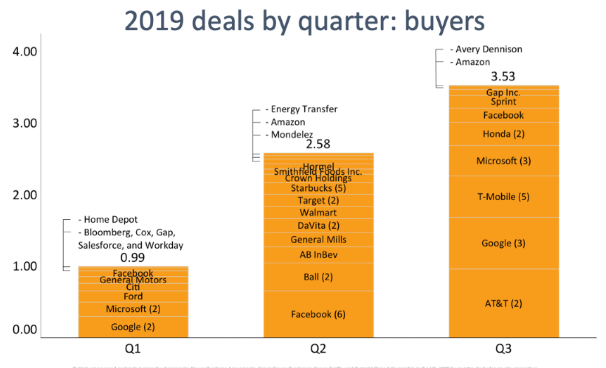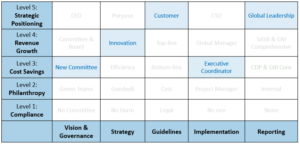This website uses cookies so that we can provide you with the best user experience possible. Cookie information is stored in your browser and performs functions such as recognising you when you return to our website and helping our team to understand which sections of the website you find most interesting and useful.
December 11, 2019
The Evolving Role of ESG Leadership & Public Policy
SR Inc’s 4th Quarter Symposium Includes Discussion on ESG Leadership and Public Policy Promotion
SR Inc was happy to bring some needed positivity to Capitol Hill on Thursday, December 5th as we celebrated Akamai Technologies as the Sustainable Business & Enterprise Roundtable (SBER) Outstanding Corporate Leader of 2019 and Sean Kinghorn as the SBER Outstanding Corporate Executive of 2019 at our 4th Quarter Executive Symposium in DC. The first 90 minutes of our discussions centered on ESG leadership and policy leadership, with a presentation on management research and best practices from SR Inc CEO Jim Boyle and updates from Mike Mattera, Director of Sustainability at Akamai Technologies.

Jim Boyle started off by presenting on best practices gleaned from our Member-Clients on how leaders are leveraging public commitments to engage the C-Suite and align with the most sought-after customers, talent, investors, and host communities. The importance of ESG performance for public companies has become increasingly evident over the past several months. In July, the U.S. House of Representatives held its first hearing on mandatory ESG disclosures for public companies. After the hearing, SBER Member-Executive Evan Harvey, Global Head of Sustainability at Nasdaq commented, “Nasdaq has long advocated better understanding of ESG dynamics in the market, more equitable access to decision-making data and better metrics themselves. Any emerging standard must reckon with the disclosure burden that companies already bear and strike a balance between the burden and benefit of transparency.”
In August, the Business Roundtable released an updated Statement on the Purpose of a Corporation, which underscores the importance of multi-stakeholder capitalism focusing on delivering value to customers, employees, suppliers, and communities. Additionally, in September, Bank of America Merrill Lynch’s Global Wealth ESG Primer detailed the top 10 reasons companies should care about ESG, reflecting a transformed conventional wisdom that now recognizes ESG is the best signal of future earnings risks, even better than debt leverage. Furthermore, in October, using a full-page ad in The New York Times, 11 leading environmental NGOs called on businesses to advocate for policies at all levels of government consistent with climate science. Specifically, they ask for CEOs to (1) advocate for policies consistent with Net Zero Emissions, (2) align their trade associations’ advocacy with science-based climate policy, and (3) fund advocacy that advances responsible climate policies. Then in late November, 150 legislators in the U.S. House introduced the 100% Clean Economy Act of 2019, which would bring greenhouse gas emissions to net zero by 2050 across all sectors of our economy – from transportation to manufacturing to electricity – by replacing carbon-polluting energy with wind, solar, and other clean sources of energy.

Another important milestone in this area was the release of the 1.5 degrees C Special Report from the UN Intergovernmental Panel on Climate Change (IPCC) late last year and the response of the Science-Based Target Initiative to tighten its standards and move towards net zero by 2035-2050. As a key way to get to Net Zero Emissions, scores of the world’s most influential companies are committing to 100% renewable power, on average by 2028 or earlier. The Science-Based Target Initiative recently crossed the threshold of 700 companies committing to keeping global warming to below 2 degrees and the RE100 surpassed 215 companies committing to 100% renewable electricity. Additionally, the Renewable Energy Buyers Alliance (REBA), of which SR Inc is a proud sponsor, has tracked the accelerating corporate procurement of new large-scale off-site renewable energy. Through the first three quarters of 2019, there have been more of these renewable energy deals than any previous full year (see Figure 1). This recent growth has been driven by not just IT companies like Google and Facebook, but also consumer discretionary and consumer staples companies like Ball, General Mills, and Walmart.

Through SR Inc’s annual Member Diagnostics and Assessments with over 75 Member-Clients over multiple years, we’ve repeatedly seen five levels of maturity in a more sustainable approach to business. SR Inc advisors have found it helpful to recognize that ESG efforts often begin with a focus on compliance, then evolve through a relatively predictable path into an organized program focused on philanthropy, then cost-savings, then revenue growth, and finally strategic positioning. When companies propose and embrace ambitious goals like 100% renewable energy or Net Zero Emissions, it can allow what otherwise might be more modest programs focused on cost savings break through to helping the company benefit from realizing more enterprise value by leveraging sustainability as a competitive advantage (see Figure 2 for a visual representation). Many SR Inc Member-Clients that have embraced ambitious sustainability goals have opened new opportunities for their sustainability teams and the companies as a whole and have sometimes brought our clients directly into the CEO’s office.

Mike Mattera, Director of Sustainability at Akamai Technologies, the SBER Outstanding Corporate Leader of 2019 award winner, has seen this phenomenon first-hand. Akamai, which just released its 2019 Sustainability Report, is exploring ways to make the internet and data center sector more sustainable by maximizing server efficiency, ensuring proper disposal of electronic waste, and using renewable energy at its leased server locations where most of the company’s impacts lie. Akamai is also participating in innovative green power procurement methods like renewable energy passthroughs and Buyer Organized Aggregated VPPAs. Akamai has a 2020 goal to reduce GHG emissions below 2015 levels by sourcing renewable energy for 50% of global network operations. The company also has a second goal to reduce network energy and scope 2 GHG intensity per unit traffic per year by 30%. The popularity and success of these efforts within and outside the company have given Mike direct access to his CEO, whom he meets with quarterly.
Mike spoke about Akamai’s policy work, which has focused on cyber security, diversity & inclusion, and now sustainability. Akamai’s sustainability advocacy in 2019 has included collaboration between the environmental NGO Ceres and other IT companies who are pressuring their utility in Virginia to adopt more renewable energy. By working with his policy team and searching for a well-established message that aligned with Akamai’s mission, Mike and his collaborators were able to get the utility to listen and actively participate in a discussion on renewable energy. Mike and his colleagues have also worked to integrate sustainable policy work into more places where they work, operate, and live. For example, in late October, Mike presented on Akamai’s experience with renewable energy with SR Inc’s Jim Boyle at the Massachusetts State House briefing on the MA Legislature’s Clean Energy Caucus Act that would transition the state to 100% renewable electricity by 2035. Through this advocacy work, Mike has found that by bringing Akamai’s voice to the table he has elicited often latent support from employees, C-Suite and Board. He strongly encourages more peer companies to work together on sustainability policy because with larger numbers, companies can catalyze greater action.
 As Manager of Research & Consulting at Sustainability Roundtable, Inc., Jeff Meltzer provides outsourced program assistance to clients on a one-to-one basis, helping real estate, operations, and sustainability executives set goals, drive progress, and report the results of their sustainability programs. Jeff holds a Master of Environmental Management from Duke University’s Nicholas School of the Environment and a B.A. in Environmental Policy from Colby College. He has relevant work experience with the Procurement and Property Services team at Citizens Bank as an EDF Climate Corps Fellow, with the EHS and Sustainability team at L’Oréal, and with the EPA Green Power Partnership as an Environmental Analyst at Eastern Research Group. He has client project experience with Biogen, helping the company develop a Scope 3 supplier engagement strategy to achieve its Science-Based Target. Jeff is also an active participant in sustainability groups, is an accredited LEED Green Associate, is trained in the GRI Standards and GHG Protocol, was the Co-President of the Duke’s Net Impact club, and is an active member of the professional Net Impact Boston leadership team.
As Manager of Research & Consulting at Sustainability Roundtable, Inc., Jeff Meltzer provides outsourced program assistance to clients on a one-to-one basis, helping real estate, operations, and sustainability executives set goals, drive progress, and report the results of their sustainability programs. Jeff holds a Master of Environmental Management from Duke University’s Nicholas School of the Environment and a B.A. in Environmental Policy from Colby College. He has relevant work experience with the Procurement and Property Services team at Citizens Bank as an EDF Climate Corps Fellow, with the EHS and Sustainability team at L’Oréal, and with the EPA Green Power Partnership as an Environmental Analyst at Eastern Research Group. He has client project experience with Biogen, helping the company develop a Scope 3 supplier engagement strategy to achieve its Science-Based Target. Jeff is also an active participant in sustainability groups, is an accredited LEED Green Associate, is trained in the GRI Standards and GHG Protocol, was the Co-President of the Duke’s Net Impact club, and is an active member of the professional Net Impact Boston leadership team.

